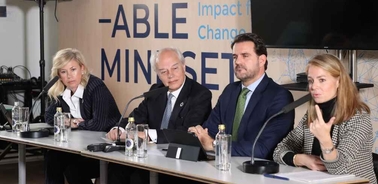- Home
- News And Events
- What’s Going On
- Ie Holds Sustainable Mindset Series As Solidarity Entity Of The Cop 25
IE Holds Sustainable Mindset Series as Solidarity Entity of the COP 25

IE University, a solidarity entity of the COP25, inspires students to leave a mark on the world with a number of events on campus over the last two weeks.
IE University delivered on its motto “Education for Sustainability” this past month with the two-week on-campus IE Sustainable Mindset series, using the United Nations Sustainable Development Goals as a framework to advance student contribution to the world’s most pressing challenges.
The importance of Sustainable Finance and EDGs, circular economy, and a need for a green taxonomy were amongst the different discussion points raised.
In its role as a solidarity entity of the COP25, IE explained the importance of education as a driving force of change in the economy, society, and biosphere.
“IE University participated in the COP25 with panels and campus activities because we believe universities are one of the most powerful tools for generating knowledge, raising awareness about the climate crisis, and promoting change,” said Cristina Andrade from Campus Life.
The “Role of Sustainable Finance” took center stage at the Sustainable Mindset event when IE Business School Dean Martin Boehm welcomed guests to a round table discussion that included: Iván Díez Saínz, Country Head Iberia and Latam; Groupama, Almudena Mendaza, Head of Sales Iberia; Natixis IM, Marisa Aguila, Managing Director; Head of Iberia; Allianz Global Investors and Joaquín Garralda, Dean of Academic Affairs and Senior Advisor of Social Innovation at IE.
“IE Business School is much concerned about sustainability and understanding how we can support and align the Sustainability goals that have been developed by the United Nations,” said Martin Boehm.
“The role of finance in sustainability is absolutely necessary because in order to have an impact in the world you need financial means to accomplish this.”
Boehm highlighted how IE Business School train future leaders by including sustainability in the curriculum.
“They traveled to sub-Saharan Africa to help with micro-financing opportunities and implement ideas for long-lasting impact in the economy under less privileged societies,” explained Boehm. “This specific example shows how management, business, investors, and financiers can have an impact and leave a mark on the world and try to create a better future for us all.”
The IE panel highlighted the new direction of the finance sector, and sustainability that is working with three central factors to measure sustainability and societal impact-- the so-called ESGs (Environmental, Social, and Governance). These criteria help to determine the future financial performance of companies through return and risk analytics.
“We can be different, but we are all headed in the same direction. We have to comply until 2030 with the SDG goals. You can focus more on some goals or ESGs, but we are going towards the same direction, and this is a very good starting point,” said Díez Saínz.
The panel concluded there is a need for regulators to promote transparency and to set global standards or a green taxonomy to avoid greenwashing. This will involve investing with a long-term mindset to advance the transition towards the end goal.
“The first step is to have a more homogeneous taxonomy in Europe to be able to differentiate the people who are doing the ESGs correctly with specific metrics and those who aren’t,” Mendaza explained.
“It’s not about investing in pure green energy. It’s about what we need now, and that is to invest in the transition,” said Aguilar. “The step is to funnel private capital into the huge economic change we need to drive in society to fight the economic crisis.”
Garralda explained that the long-term goal of these events and actions should be to engage people in the conversation around ESGs and sustainability.